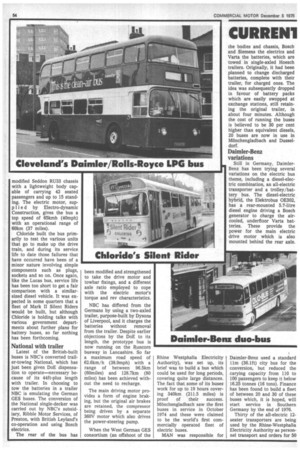CURREN1
Page 56

Page 57

If you've noticed an error in this article please click here to report it so we can fix it.
PROSPECTS—continued
the bodies and chassis, Bosch and Siemens the electrics and Varta the batteries, which are towed in single-axled Hoesch trailers. Originally, it had been planned to change discharged batteries, complete with their trailer, for charged ones. The idea was subsequently dropped in favour of battery packs which are easily swopped at exchange stations, still retaining the original trailer, in about four minutes. Although the cost of running the buses is believed to be 30 per cent higher than equivalent diesels, 20 buses are now in use in MOnchengladbach and Dusseldorf.
Daimler-Benz variations
Still in Germany, DaimlerBenz has been trying several variations on the electric bus theme, including a diesel-electric combination, an all-electric transporter and a trolley/battery bus. The diesel-electric hybrid, the Elektrobus 0E302, has a rear-mounted 5.7-litre diesel engine driving a Bosch generator to charge the aircooled, underfloor Varta batteries. These provide the power for the main electric drive motor which is also mounted behind the rear axle. more are expected by early 1977. Varta batteries are again used, situated in quick-change compartments in the centre of the vehicle, which is a converted 1-ton transporter. The drive motor is mounted forward of the batteries on a separate subframe.
Last of Daimler-Benz's projects is the Duo-bus, a trolley/ battery-electric vehicle which is again based on the Elm (36.1ft) city bus. Taking power from overhead cables, it charges its batteries which can then be used to power the bus in areas where overhead lines are not fitted or where access by an ordinary trolleybus would be difficult. A prototype bus is running in Esslingen, West Germany, and sufficient funds are being made available by the German Ministry of Technology to build a fleet ready for use by the end of next year. time using a Peugeot petrol engine to drive the generator. SOVEL (the Soci•ete de Vehjoules Eleetriques) built two different prototypes of its electric bus in conjunction with the French Electricity Board. They went into service with


































































































































